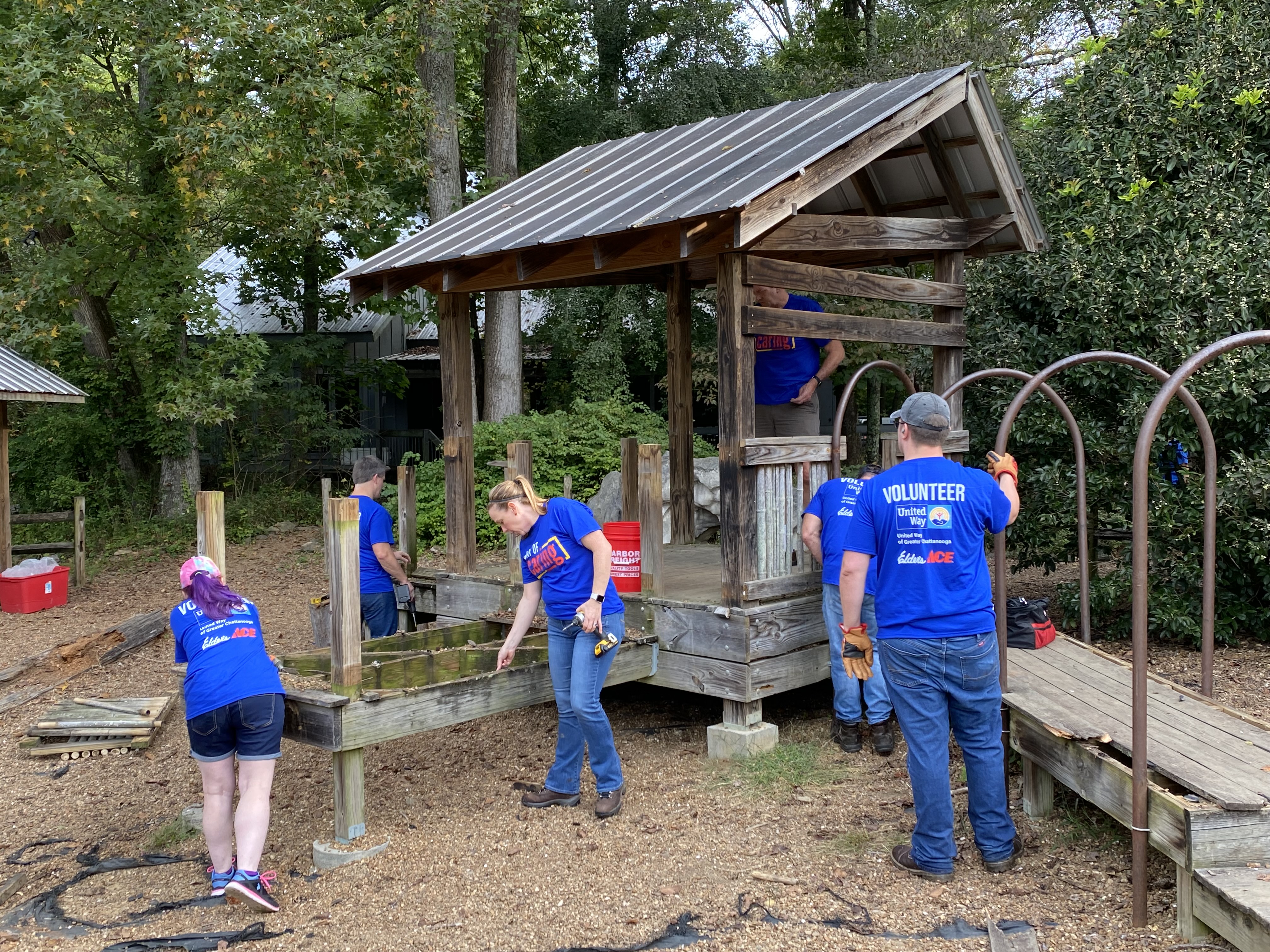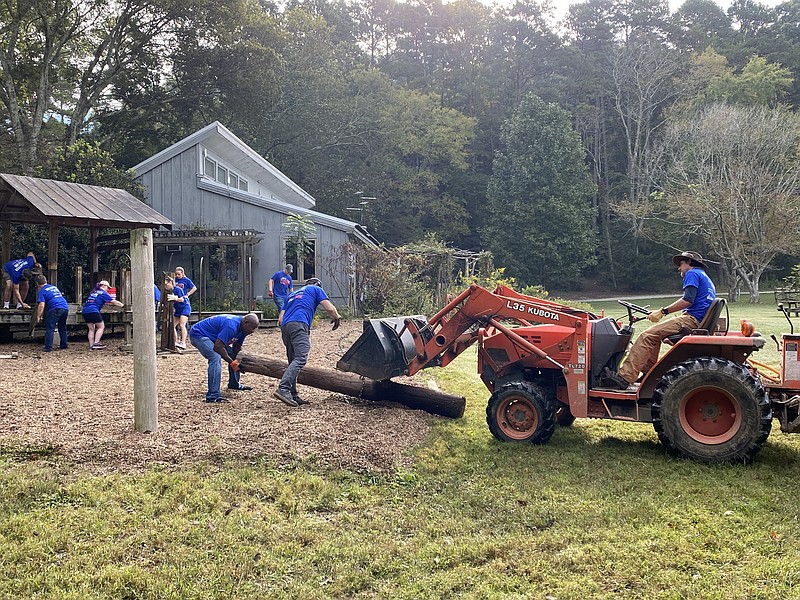After a record year of giving in 2020, ongoing pandemic recovery, equity and social justice stayed top of mind, and Chattanoogans reached into their pockets to create what's proven to be another strong year for charitable giving.
High interest in charitable giving follows national trends and is bolstered by strong financial market performance and large gifts from the wealthy.
Maeghan Jones, president and CEO of the Community Foundation of Greater Chattanooga, said last year the nonprofit granted around $20 million through both its endowed fund and the donor-advised funds - with $3 million going directly to COVID-19 relief.
The Community Foundation expects to see another increase this year, opening with $19 million worth of donor-advised funds, which continue to gain favor in that donors can ensure their funds are used in ways that align with their passions.
Lesley Scearce, president and CEO of United Way of Greater Chattanooga, said the organization's campaign results won't be complete until March, but she anticipates the results will be on par with last year's record performance.
"We're anticipating a strong year, and we think it's because Chattanoogans just continue to respond with great generosity to the needs that they see," she said. "And we expect that a lot of that giving would be directed still towards pandemic-related efforts, as people are continuing to feel the brunt of that."
While many in the U.S. are enjoying economic recovery, the amount of need in the community continues to grow, Scearce said.
"The cost of living is so outpacing either earnings and savings that families are more and more financially stressed," she said. "Then you add a pandemic where there's been uneven impact and an uneven recovery financially across the nation, and financial stability is so much less present for so many of our households."
Maj. Mark Smith from the Salvation Army of Chattanooga echoed Scearce's sentiments and said the organization had not met its fundraising goals for the year heading into Christmas.
"The needs are great and the fact that COVID has not gone away, it's exasperated some of the situation. We're still seeing a lot of people needing help. We're still seeing that the need is growing faster than the support. And that's concerning," he said.
Since the pandemic, Scearce said the United Way had to increase the capacity of its 211 operations - United Way's information and referral service that connects people in need to community resources, such as food or financial assistance for utilities or medical care - from four to 12 lines to handle the large volume of calls.
Abby Garrison, vice president of community investments for United Way of Greater Chattanooga, said the number of calls received this year amounts to roughly a quarter of Hamilton County's population.
"It's probably your neighbor, or my neighbor, who had never called before COVID, but who now really is struggling for something and needs help," Garrison said.
With those evolving needs come new donor preferences and changes in how funds are disbursed, many of which started before the pandemic.
As COVID-19 highlighted disparities and hardships, Jones said donors are now wanting to focus on systemic issues in addition to addressing immediate needs.
"Our neighborhoods were grappling with many of these issues before the pandemic - hunger, homelessness, poverty, racial disparities - but the pandemic exacerbated them, and for many, that brought new awareness to some of these issues," she said. "While this has resulted in increased giving, particularly to frontline organizations, we've also seen donors asking more questions about how we get at those root causes."
 Contributed photo by CBL Properties / Volunteers for United Way of Greater Chattanooga go to work during the Day of Caring event at Reflection Riding Arboretum & Nature Center in Chattanooga, Tennessee on Sept 30, 2021. As a whole, Chattanooga has seen an increase in charitable giving since the COVID-19 pandemic.
Contributed photo by CBL Properties / Volunteers for United Way of Greater Chattanooga go to work during the Day of Caring event at Reflection Riding Arboretum & Nature Center in Chattanooga, Tennessee on Sept 30, 2021. As a whole, Chattanooga has seen an increase in charitable giving since the COVID-19 pandemic.Nationally, while total giving from individuals continues to rise, the number of donors has consistently decreased - with contributions from the middle class, which historically accounted for a large portion of charitable donations, shrinking more and more.
At the same time, the mechanics for how people donate are changing and becoming more sophisticated, such as lots of smaller donations being transacted online or through applications on their phones.
Over the past five years, Jones said there's been increased interest in donor-advised funds - which allow donors to make a charitable contribution, receive an immediate tax deduction and then help decide how those funds are directed. Donors in turn benefit from foundation staff's deep knowledge of the local nonprofit sector.
"When those donors come to us, we spend a lot of time really understanding what their values are, what they care about, and then connecting them to those passions and those needs in the community," Jones said, adding that the pandemic accelerated the trend. "Our donors were turning to us to say, what are the greatest needs in our community? How can we support the organizations on the front line who are really caring for those who are most vulnerable?"
While Jones said she believes fewer people donating hasn't been as pronounced in Chattanooga - which she attributes in part to the city's strong culture of philanthropy - there's a continued need to engage and cultivate middle and smaller givers, as well as the next generation of givers.
Scearce said that in the past, there was more inherent trust in nonprofits to take donations and use them in a meaningful way. Now, donors want to know exactly where their funds are going, that they're making an impact and often want to participate in the process.
"A younger generation, especially, wants ultimate transparency - where are the dollars going, and where are the results year over year that we can see a transformational change," she said.
Millennial Woodson Carpenter, who works at the Community Foundation, is a trustee for the UNFoundation - a play on the word "unconventional" - a grassroots, volunteer-run giving circle where its roughly 30 trustees work to fund individual or organization projects that "make Chattanooga better," according to the UNFoundation's website.
Trustees each contribute $100 per month to grant $3,000 to a deserving applicant, often leaning toward projects to benefit children, animals, the environment, the arts or equity. Trustees then collaborate to decide which project they want to fund that month.
"The value of this type of group that can go unseen is an example setting or a model that might get folks more engaged," Carpenter said. "We see these large donor organizations moving a lot of money, but in a lot of our communities, for a lot of our neighbors who have these great ideas, they can make $3,000 go a long way."
Those trends along with evolving needs of the community are leading Chattanooga's United Way to roll out a completely new way of investing funds in 2022 - away from an allocations-based model to a competitive process.
The old way allocated funds to the same list of highly vetted, respected organizations year after year. Now, they will use an application process open to any nonprofit organization in its six-county footprint.
"We'll still be focused on education, health and stability. We've done a ton of work around the outcomes we're looking for and the types of strategies that we're interested in investing in, but on the whole, it's going to be much more open and much more robust and inclusive," Abby said.
Scearce said the redesign, which has been four years in the making, will allow United Way to be more nimble in its response to future needs.
"In a season that at times can feel pretty dark, pretty hopeless, we're going to have a big year of shining a light on all the great things that are happening in our community," she said.
Contact Elizabeth Fite at efite@timesfreepress.com or follow her on Twitter @ecfite.
